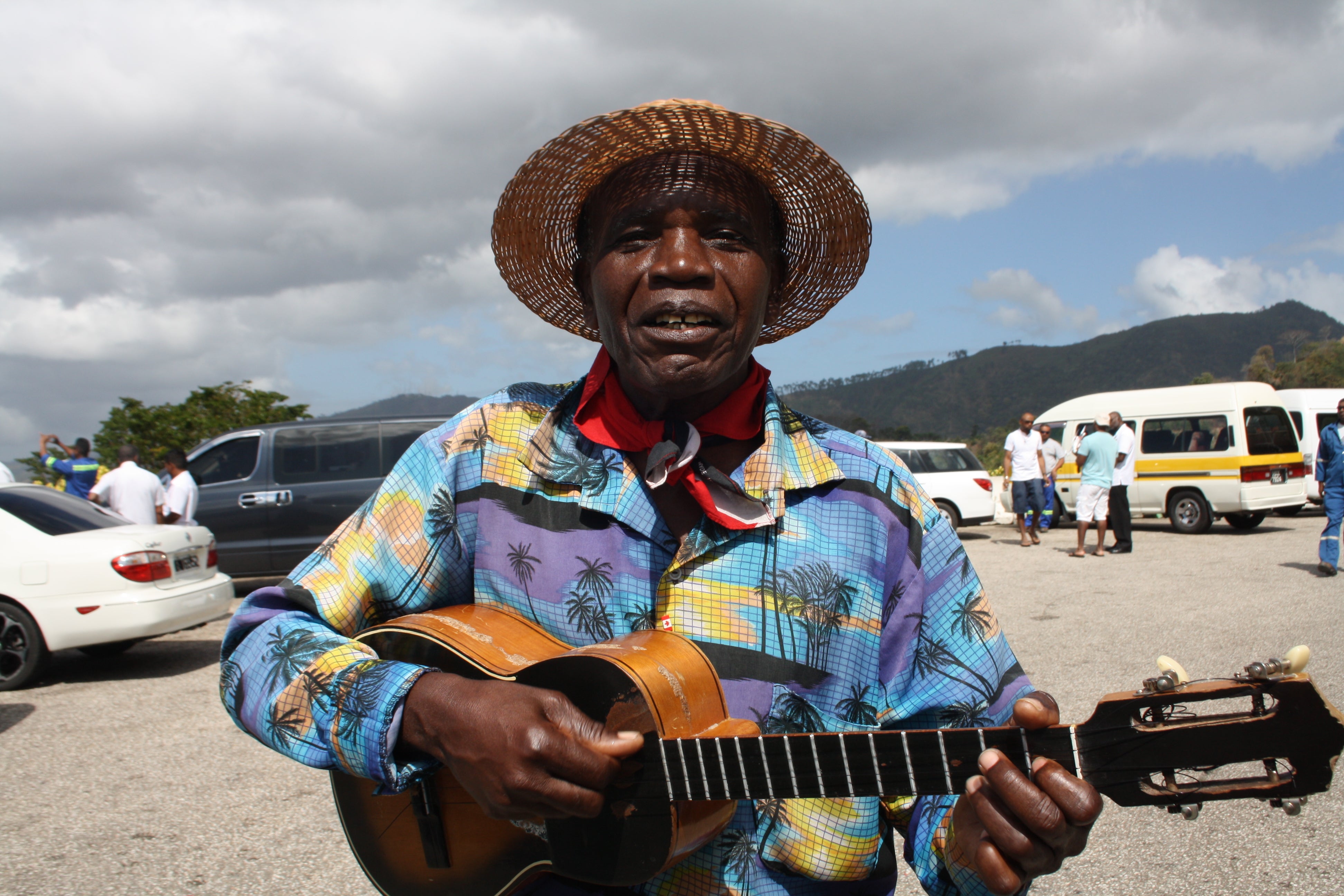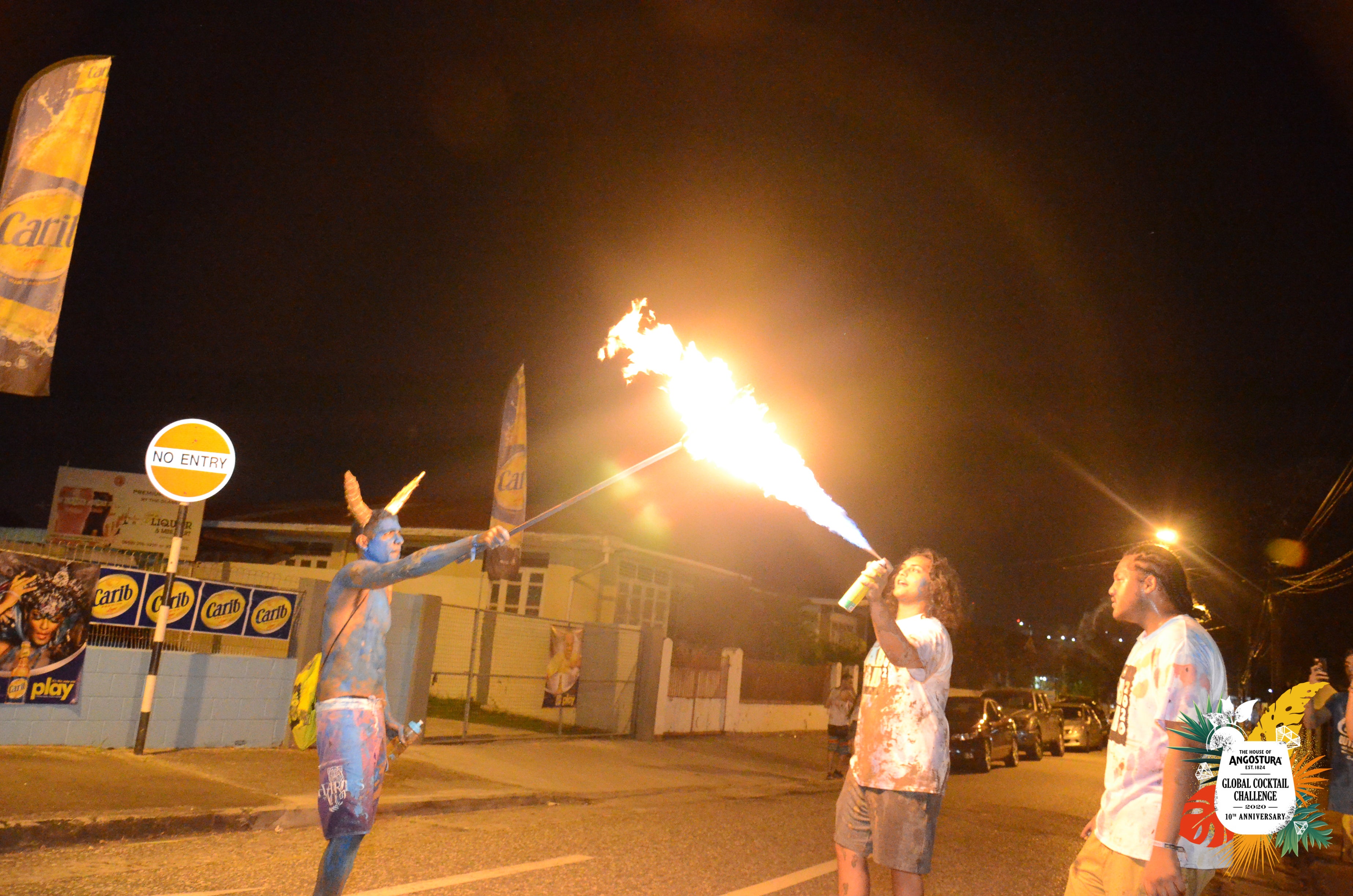Feathers, sweat and lots of rum: How to do Trinidad Carnival like a local
After an enforced break during the pandemic, Trinidad’s annual festival of hedonism is set to be wilder than ever next year, writes Claire Dodd

There’s a devil on the bus as I make my way back to the hotel. Covered in black oil, mottled with neon pink powder. And he’s fast asleep. It’s 7am, but the air is already thick with heat and the sweet whiff of sweat and rum as a cluster of green cavemen in sodden fur tunics make their way towards the vehicle, a dance still in their step, light-up horns blinking limply. This is the aftermath.
Bird song echoes down the street as the residents of this usually quiet suburb tend gardens in the angular haze of the morning sun, hosing plants, and the occasional returning reveller, who cheers and dances, welcoming the cool-down after dancing since 2 or 3am. Over the city, the frantic throb of basslines rumble on, interrupted by a passing truck whose music is blaring out the lyrics “We don’t party normal”.
Next to me, a man stares absently ahead, his deliberately shredded T-shirt, straw hat and flower lei all entirely spattered with a murky wet rainbow of mud and paint. It’s the silent contemplation only joy, exhaustion, booze and adrenaline can invoke. It’s not your typical Monday morning. But Port of Spain, Trinidad’s capital, is well used to the madness.

“I think a lot of people, when they come for the first time, are not physically and emotionally prepared,” says Trinidadian DJ, producer and bar owner, Christopher Leacock, better known as Jillionaire, a former member of Major Lazer. He’s trying to explain to me what makes the island nation’s world-famous annual carnival more than just a party. For Trini’s, it’s state of mind, an axis, an intrinsic expression of identity.
“Our culture focuses so much on the seasonality of carnival. We really build our lives around it. It’s consuming, actually. It’s this super high energy experience,” he adds, meeting my eye for emphasis. “It can be, I want to say, almost a religious experience. It’s Christmas, your birthday and your anniversary all rolled into one.”
Carnival 2023 then, is going to be a big one. Cancelled or limited due to the pandemic in 2021 and 2022, next year marks the event’s first full, and much anticipated, return.
Our culture focuses so much on the seasonality of carnival. We really build our lives around it. It’s consuming
Usually, every year from Boxing Day until the Tuesday before Ash Wednesday, Trinbagonians let their hair down and party with a stamina that’s frankly intimidating. From the soca concerts, steel band (pan) competitions, calypso tents and countless parties (or fetes if you’re a Trini), the dual island nation of Trinidad and Tobago pulsates to the sound of a million basslines.
They’re all a vital part of the build-up to this, the pinnacle: the parades of carnival Monday and Tuesday, where the revelry and ritual are all a purge before the piousness of Lent. While it’s really these two days visitors like me come to experience, you need at least a week to fully to explore the island and sample a few fetes.
With an economy dependent on oil and gas production, Trinidad isn’t really a beach-hotel destination (the nation’s other island, Tobago, provides that). Though there are beautiful beaches and forest-covered mountains to discover, you come here for the culture – best experienced, aside from carnival, in Trinidad’s food and drink.

“We’re one of the most diverse countries in the world, and that feeds into our national cuisine,” says Andrew Welch, founder of Banwari Experience, a tour company that specialises in taking visitors off the beaten track to discover the “real” Trinidad.
Over 500 years of colonialism and settlement – with Spanish and English colonialists, French planters, enslaved Africans, and indentured Indian labourers just a few of the people to have called the island home alongside its native Amerindian population – have uniquely shaped these islands.
He’s easing me into exploring with frequent food stops. A Hindu temple built out at sea is followed by doubles, a sandwich of fried bread and curried chickpeas topped with either mango, shadon beni, cucumber, coconut, tamarind or pepper sauce. After visiting a pan yard – where steel bands, which local communities support like football clubs, practise late into the night – we pick up corn soup followed by pholourie, a fried, spiced dough ball with tambran (tamarind) or mango chutney.
A man stares absently ahead, his deliberately shredded t-shirt, straw hat and flower lei all entirely spattered with a murky wet rainbow of mud and paint
“We must taste savoury and sweet at the same time. And it must be somewhat of an explosion. In the little shops, and the stalls lining carnival, on the street, you expect to see what granny cooks. That’s what real Trini food is,” he says.
After the cool air of Northern Range mountains, it’s time for bake and shark (a deep-fried shark fillet in a deep-fried dough ball) at Maracas Beach, which I clock as the perfect post-carnival wind-down spot. Don’t expect tranquillity; the basslines and dancing continues.
Stamina duly built up, it’s time to sample carnival’s other essential ingredient. “Rum is just a part of society here,” says Jillionaire. “Especially on days like carnival Monday and Tuesday, drinking White Oak.”
Aptly, we’re meeting at Trinidad’s sole distillery, Angostura. Known the world over for its bitters – the funny bottle with the yellow cap and oversized white label – it also lays claim to an award-winning rum range. Carnival coincides with the distillers’ biannual global cocktail competition, which draws bartenders from across the world, and Jillionaire is here to judge it.

A tour of the distillery in Laventille takes in barrel-filled warehouses, the locked door behind which the bitters recipe is stored – only five people know its secret recipe – and, of course, a rum-tasting session. Besides White Oak, there’s 5 Year Old, 7 Year Old, 1919, and the top-of-the-range 1824.
“We don’t get as funky as the Jamaicans,” says master distiller, John Georges. “With Barbados and St Lucia, there’s sort of that sweet thing. We’re somewhere in the middle. Our rums are flavourful, because we have kept what we consider to be the really interesting notes. They’re clean but not too clean, dirty but not too dirty.”
Carnival itself is a cultural fusion. Rooted in the elaborate late 18th-century masquerade parties of the French, as well as the post-emancipation festivities of freed Africans, carnival still embodies a rebellious connection to ancestral African traditions, where characters of folklore – from the blue devils to the stilted walkers, the moko jumbies – return to roam the streets.
And, unlike some other carnivals, Trinidad is not about spectating. Joining a carnival band (a group that follows dancing behind a sound truck) means you can get involved. The pre-dawn parties of J’ouvert, the dark side of carnival, revel in mischief as you follow a sound truck down the road, all while throwing paint, chalk, chocolate, oil or mud. Be prepared to get up at 2am, be partying by 3am, and be made to shower outside before your hotel will even dream of letting you back in. (Don’t worry: some even have DJs and food stalls to keep you going while you wait.)

As I scrape neon-coloured powder from off my eyelids, out of my ears, even from my teeth, a DJ leaning from the slowing moving truck screams into the mic “Put a woman on your shoulder!”. Ahead, someone stage-dives from the truck, crowd surfing to the pavement. People dance atop of walls, and the awnings of shops, flinging paint and powder and filling the street as the sun begins to rise over the booming bass and swaying bodies. A blue devil lights an aerosol can, turning the air red hot. Normal life is suspended, as we move as one down the road to soca songs whose lyrics encourage people to “free up”, and “get on bad”.
With the rising sun starting to etch out palm trees and the tin roofs of frilly Victorian houses, it’s time to go. Having joined a band for the rhinestone and feather parades of carnival Tuesday, I need to get ready. If Monday is about getting dirty, Tuesday is about looking pretty.
Joining a band (something you’ll need to sign up for months in advance) means choosing one of their outfits to parade in. For women, that’s a jewelled bikini and feathers, for men, usually some blinged-up swim shorts. Don’t worry, rum helps quell any nervousness.
As I scrape neon coloured powder from off my eyelids, out of my ears, even from my teeth, a DJ leaning from the slowing moving truck screams into the mic ‘Put a woman on your shoulder!’
Come 9am, we’re back on the streets again. The air fizzes with a palpable power and shared energy. Strangers become instant friends as we move together down the road.
“People maybe don’t come every year, and they take a year off,” muses Jillionaire. “But there’s always that hole inside of you where carnival usually fits.” After a trying few years off, this cleansing break from normality couldn’t be more needed.
Travel Essentials
Getting there
Trying to fly less?
Trinidad isn’t the easiest destination to reach flight-free. However, some cargo ships sailing the route from the UK will take passengers; just be prepared for a number of stops across other Caribbean islands before reaching Trinidad’s capital, Port of Spain.
Fine with flying?
British Airways flies from London Gatwick to Trinidad.
Staying there
The Hilton Trinidad is located close to the Port of Spain’s Queen’s Park Savannah, the location of much carnival activity. The hotel also hosts a number of fetes. During the carnival period, a standard king bed room starts from £478 per night, excluding taxes, room only.
More information
Trinidad Carnival 2023 will take place on 20 and 21 February. Can’t wait until then? Tobago is set to have its own carnival, culminating in a parade of the bands on 30 October 2022.
The Angostura Distillery Experience includes a tour of the rum distillery and bitters’ manufacturing room and is offered daily from Monday to Friday from 10am-1pm. Tours cost TT $60 (£7.66); advance bookings required (tours@angostura.com).
Join our commenting forum
Join thought-provoking conversations, follow other Independent readers and see their replies
Comments
Bookmark popover
Removed from bookmarks